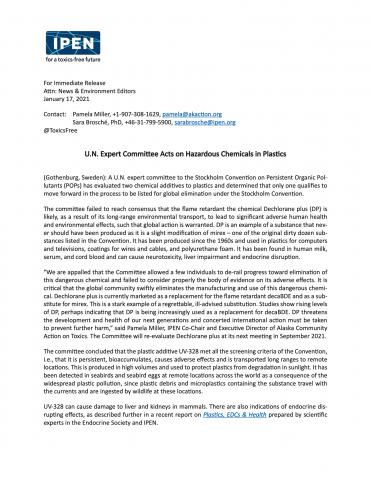U.N. Expert Committee Acts on Hazardous Chemicals in Plastics

Gothenburg, Sweden - A U.N. expert committee to the Stockholm Convention on Persistent Organic Pollutants (POPs) has evaluated two chemical additives to plastics and determined that only one qualifies to move forward in the process to be listed for global elimination under the Stockholm Convention.
The committee failed to reach a consensus that the flame retardant the chemical Dechlorane plus (DP) is likely, as a result of its long-range environmental transport, to lead to significant adverse human health and environmental effects, such that global action is warranted. DP is an example of a substance that never should have been produced as it is a slight modification of mirex – one of the original dirty dozen substances listed in the Convention. It has been produced since the 1960s and used in plastics for computers and televisions, coatings for wires and cables, and polyurethane foam. It has been found in human milk, serum, and cord blood and can cause neurotoxicity, liver impairment, and endocrine disruption.
“We are appalled that the Committee allowed a few individuals to de-rail progress toward elimination of this dangerous chemical and failed to consider properly the body of evidence on its adverse effects. It is critical that the global community swiftly eliminates the manufacturing and use of this dangerous chemical. Dechlorane plus is currently marketed as a replacement for the flame retardant decaBDE and as a substitute for mirex. This is a stark example of a regrettable, ill-advised substitution. Studies show rising levels of DP, perhaps indicating that DP is being increasingly used as a replacement for decaBDE. DP threatens the development and health of our next generations and concerted international action must be taken to prevent further harm,” said Pamela Miller, IPEN Co-Chair and Executive Director of Alaska Community Action on Toxics. The Committee will re-evaluate Dechlorane plus at its next meeting in September 2021.
The committee concluded that the plastic additive UV-328 met all the screening criteria of the Convention, i.e., that it is persistent, bioaccumulates, causes adverse effects, and is transported long ranges to remote locations. This is produced in high volumes and used to protect plastics from degradation in sunlight. It has been detected in seabirds and seabird eggs at remote locations across the world as a consequence of the widespread plastic pollution since plastic debris and microplastics containing the substance travel with the currents and are ingested by wildlife at these locations.
UV-328 can cause damage to the liver and kidneys in mammals. There are also indications of endocrine-disrupting effects, as described further in a recent report on Plastics, EDCs & Health prepared by scientific experts in the Endocrine Society and IPEN.
“It´s great to see one more hazardous plastic additive moving forward in the Convention process. This decision is especially important since it highlights that it is not only the visible plastic pieces that now contaminate even the most remote locations of the world, but also the invisible chemicals they carry. Substantial efforts should be made to rapidly phase out hazardous chemicals used in plastics as well as drastically reduce the production of new plastics to protect both public health and the environment,” said Dr. Sara Brosché, IPEN Science Advisor.
Other important decision of the committee at the meeting included:
- the pesticide methoxychlor was evaluated and found that it is likely, as a result of its long-range environmental transport, to lead to significant adverse human health and environmental effects, such that global action is warranted.
- a recommendation to Parties to promote the transition to alternatives to SCCPs while also take into consideration the POPs characteristics by these alternatives. It was also noted that no Parties for whom the Convention listing is in effect had in fact registered for any of the specific exemptions in existence today.
- a recommendation to promote the transition to alternatives to deca-BDE, taking into consideration the POPs characteristics of these alternatives.
About the Stockholm Convention expert committee
The week-long meeting of the Stockholm Convention’s expert committee was held online from 11-16 January 2021. The Committee, known as the Persistent Organic Pollutants Review Committee (POPRC), is an expert committee of scientists that reviews chemicals proposed for listing under the Treaty and makes recommendations to the Stockholm Convention Conference of the Parties. Members of the POPRC are government-designated experts in chemical assessment or management.
IPEN is a public interest NGO network working in more than 120 countries to reduce and eliminate hazardous substances. IPEN has been actively involved in the POPRC process for fifteen years.
###
To arrange interviews or for more information, please contact Pamela Miller, +1-907-308-1629, pamela@akaction.org or Sara Brosché, +46-31-799-5900, sarabrosche@ipen.org
| Attachment | Size |
|---|---|
| 119.68 KB |
